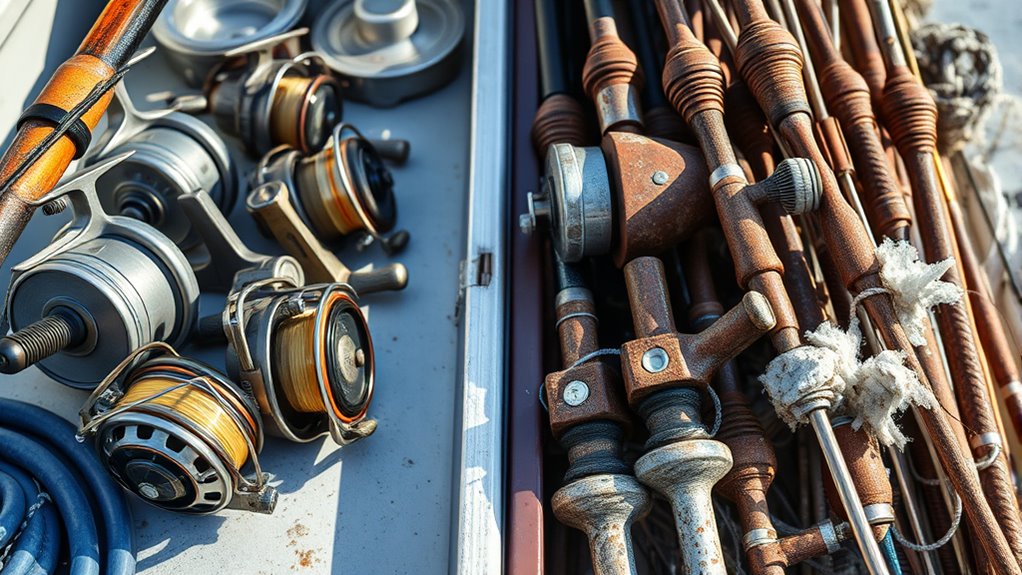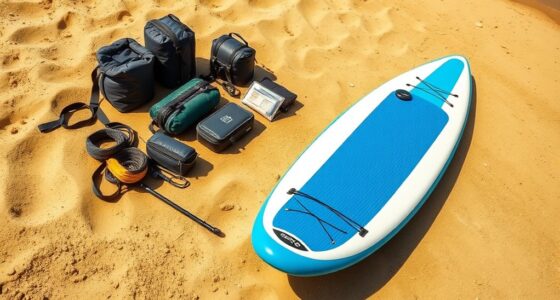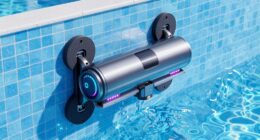When caring for gear in saltwater, you need to be more diligent because salt and humidity cause faster corrosion. Rinse your rods, reels, and tackle thoroughly with fresh water after each trip, paying close attention to joints and moving parts. Dry everything carefully and apply lubrication to prevent rust. In freshwater, maintenance is simpler, but regular cleaning and proper storage still extend your gear’s life. Continue exploring to uncover more helpful tips for ideal gear care.
Key Takeaways
- Saltwater gear requires thorough rinsing and frequent cleaning due to higher salt and salt crystal buildup.
- Freshwater gear needs less intensive cleaning but still benefits from regular rinsing and lubrication.
- Saltwater environments accelerate corrosion, necessitating more diligent drying and protective lubrication.
- Storage in a dry, cool place is essential for both, with saltwater gear needing extra corrosion inhibitors.
- Inspect and remove rust or corrosion more often on saltwater gear to maintain performance and longevity.

Maintaining fishing gear in freshwater and saltwater environments requires different approaches because saltwater is more corrosive and can cause gear to deteriorate faster. If you fish in saltwater, you need to be especially diligent about corrosion prevention. Saltwater’s salty, humid environment accelerates rust and corrosion on metal parts, so cleaning techniques become vital in extending your gear’s lifespan. After each trip, rinse your rods, reels, and tackle with fresh water to remove salt residues. This simple step helps prevent salt crystals from settling and causing corrosion. Be thorough, especially around joints and moving parts, since salt can hide in tiny crevices and lead to rust if left untreated.
Rinse gear thoroughly after saltwater trips to prevent corrosion and extend its lifespan.
Once you’ve rinsed your gear, dry everything carefully with a soft cloth or towel. Moisture left on metal surfaces invites corrosion, so drying is just as important as rinsing. For added corrosion prevention, consider applying a light coating of lubricant or reel oil on moving parts. This creates a barrier against moisture and salt, reducing the risk of rust forming over time. For reels, specifically, use a reel-specific cleaner and lubricant to keep internal components free of salt buildup and functioning smoothly.
In terms of cleaning techniques, regular maintenance is essential in saltwater environments. Besides rinsing and drying, you should also inspect your gear frequently for signs of corrosion, like pitting or discoloration. If you notice any corrosion spots, use a soft brush or fine steel wool to gently scrub away rust. For stubborn spots, applying a corrosion inhibitor or a specialized cleaning solution designed for saltwater gear can help restore your equipment. Avoid harsh chemicals that could damage your gear’s finish or internal parts.
In freshwater, your gear faces less aggressive conditions, but that doesn’t mean you should neglect proper maintenance. Still, it’s wise to rinse rods and reels after saltwater use to prevent salt buildup. Regular cleaning techniques in freshwater mainly involve removing dirt, mud, or algae that can accumulate during fishing trips. Lubricate moving parts periodically and store your gear in a dry, cool place. While corrosion prevention isn’t as critical in freshwater, protecting your equipment from moisture and dirt extends its usability and keeps it performing reliably.
Ultimately, understanding the differences in maintenance techniques between freshwater and saltwater environments helps you get the most out of your gear. Saltwater demands more frequent cleaning and meticulous corrosion prevention, while freshwater gear benefits from routine cleaning and proper storage. Paying attention to these details ensures your fishing gear stays in top shape, ready for your next adventure.

Inflatable Life-Jacket for Adults| Life-Vest with Automatic/Manual Multifunctional Inflation-PFD| Lightweight & Compact Supports up to 300lbs for Kayaking Fishing Boating (Camouflage)
Inflatable Life-Jackets: Lightweight & Comfortable, Weighs 1.2lbs and features a compact, low-profile design. With a fully adjustable waist...
As an affiliate, we earn on qualifying purchases.
Frequently Asked Questions
How Often Should I Replace My Fishing Line for Freshwater vs. Saltwater Gear?
The line replacement frequency depends on your fishing habits and line condition. You should check your line regularly for wear, fraying, or weakening. Generally, replace it every few trips for fresh water to maintain ideal gear longevity. For saltwater, you might need to replace it more often due to corrosion and salt buildup. Keeping an eye on your line’s condition ensures your gear performs well and lasts longer.
Are Specific Cleaning Products Recommended for Saltwater Gear?
When cleaning your saltwater gear, you should use specialized cleaning solutions designed for saltwater conditions. Look for saltwater safe detergents that effectively remove salt and corrosion without damaging your equipment. These products help prevent rust and extend the lifespan of your gear. Regular cleaning with the right solutions keeps your gear in top condition, ensuring it performs well and lasts longer in harsh saltwater environments.
What Are the Best Storage Practices for Freshwater Versus Saltwater Equipment?
When it comes to storage tips for your equipment, you should prioritize keeping it clean and dry to promote equipment longevity. Store your freshwater gear in a cool, dry place away from direct sunlight, and guarantee all saltwater gear is thoroughly rinsed and dried to prevent corrosion. Use appropriate containers and avoid stacking to prevent damage. Proper storage helps your gear last longer and performs better during your next adventure.
How Do Corrosion Rates Differ Between Freshwater and Saltwater Gear?
You’ll notice that corrosion rates are higher in saltwater, which accelerates material degradation compared to freshwater. Saltwater’s corrosive nature reduces material durability, especially if your gear isn’t properly coated or maintained. In freshwater, corrosion progresses more slowly, giving your equipment a longer lifespan. To protect your gear, regularly clean and inspect it, and use corrosion-resistant materials to minimize the impact of these differing corrosion rates.
Is There a Difference in Cost for Maintaining Freshwater and Saltwater Fishing Gear?
Cost comparison can seem costly, but understanding maintenance challenges helps you save. You might spend more on saltwater gear because it faces corrosion, requiring frequent cleaning, coating, and replacement. Freshwater gear generally costs less to maintain, thanks to lower corrosion risks. So, you’ll find that saltwater gear’s servicing is more strenuous and expensive, while freshwater gear’s upkeep stays simpler and more affordable over time.

Onyx A/M-24 Automatic/Manual Inflatable Life Jacket, U.S. Coast Guard Approved, Low Profile, Compact Design, Manual Convertible Inflation Option
U.S. COAST GUARD APPROVED: This USCG-approved Inflatable Life Jacket inflates automatically upon water immersion or manually pulling the...
As an affiliate, we earn on qualifying purchases.
Conclusion
Whether you’re fishing in freshwater or saltwater, maintaining your gear properly is essential for longevity and performance. Saltwater gear demands more frequent cleaning and corrosion prevention, while freshwater gear is generally easier to care for. Are you willing to overlook the small differences that can save you money and frustration in the long run? Paying attention to these details ensures your gear stays in top shape, ready for your next adventure—because a little maintenance now saves a lot later.

BLUESTORM Cirrus26 Inflatable PFD Life Jackets for Adults | US Coast Guard Approved Automatic Life Vest w/Manual Override Convertibility (Nitro Red)
US COAST GUARD-APPROVED TYPE V PFD: This USCG-approved Type 5 life jacket has Type 3 performance. This life...
As an affiliate, we earn on qualifying purchases.

BLUESTORM Cirro 26 Automatic/Manual Inflatable Life Jacket PFD for Adults (Apex Black) | US Coast Guard (USCG) Approved Self Inflating Life Vest Preserver
US COAST GUARD-APPROVED TYPE V PFD: This USCG-approved Type V lifejacket with Type III performace, inflates automatically upon...
As an affiliate, we earn on qualifying purchases.










